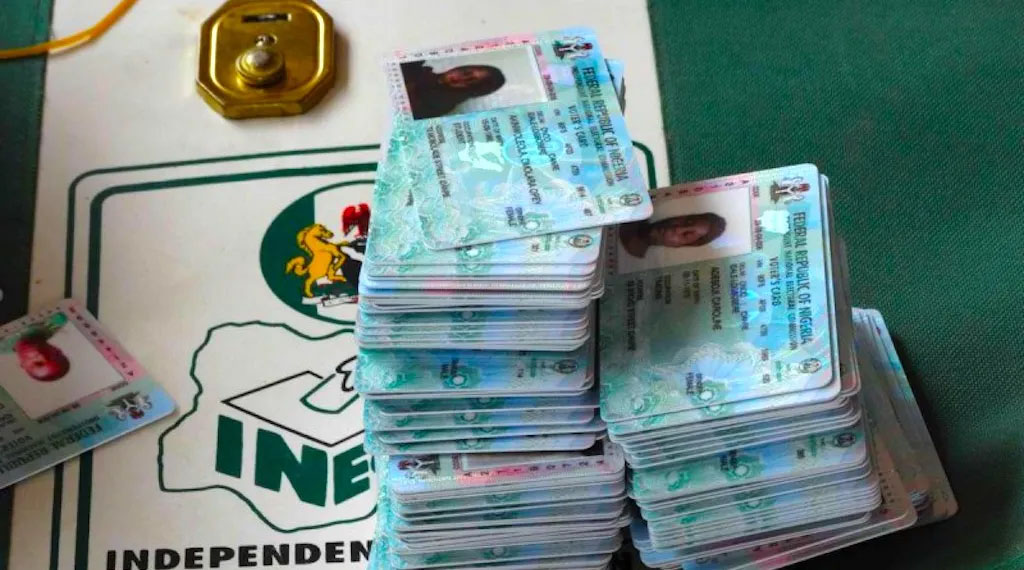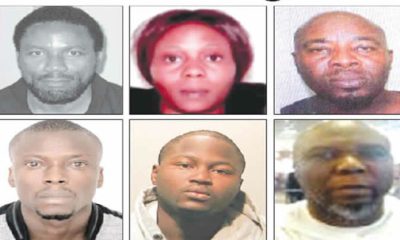metro
US, UK urged to impose visa ban on judges giving politically motivated judgments

US, UK urged to impose visa ban on judges giving politically motivated judgments
The Human Rights Writers Association of Nigeria (HURIWA) has issued a strong condemnation of recent Federal High Court judgments, calling for visa restrictions on judges allegedly involved in issuing rulings perceived as politically motivated and destabilizing for Rivers State.
The group cited recent judgments halting federal allocations to the state as alarming, calling for international embassies, including those of the United States, United Kingdom, and European Union, to impose travel restrictions on affected judges.
HURIWA’s statement follows Justice Joyce Abdulmalik’s ruling to halt financial allocations to Rivers State, which group says disrupts Nigeria’s democracy.
HURIWA argued that such judgements are reminiscent of previous politically charged decisions, such as the Imo State governorship verdict that led to a visa ban on Justice Kudirat Kekere-Ekun (now the Chief Justice of Nigeria).
According to a statement signed by HURIWA national coordinator, Emmanuel Onwubiko, on Thursday, the recent ruling, effectively disregarded a longstanding Supreme Court principle affirming that statutory allocations to states cannot be withheld by federal authorities.
HURIWA insisted that the judgement violates established legal precedence, putting Rivers State and Governor Siminalayi Fubara’s administration at risk of political destabilization.
READ ALSO:
- Multiple currencies will frustrate Tinubu’s economic policies — Ned Nwoko
- Man kills wife, injures policeman in Ebonyi
- FG, Google launch N100m AI fund for 10 Nigerian startups
“The lawsuit, initiated by a faction within the Rivers State House of Assembly loyal to former Governor Nyesom Wike, claims the power to halt funds distribution within the state. HURIWA views this as a strategic attempt to undermine Governor Fubara’s administration through judicial means,” it said.
According to HURIWA, such “partisan” judgements blatantly contradict principles of judicial impartiality, as the judiciary should uphold constitutional protections rather than favor specific political agendas.
HURIWA’s appeal also included reference to notable human rights lawyer Professor Chidi Odinkalu, who echoed similar sentiments in response to Justice Abdulmalik’s ruling. In his public reaction, Odinkalu stated that the ruling overturns a precedent set by the Supreme Court, describing the judgement as a form of judicial tyranny that dismisses the rule of law. “Today, a judge of @FederalHigh overruled the Supreme Court. This is not #RuleOfLaw; it is tyranny of the #Outlaw,” Odinkalu tweeted, underscoring the dangerous precedent this decision establishes.
In addition to Justice Abdulmalik, HURIWA highlighted several other recent rulings by Federal High Court judges that it considers constitutionally questionable. The group pointed to Justice Lifu’s recent decision regarding Rivers State Local Government elections, where he ruled that the Electoral Act, rather than state electoral laws, governs Local Government elections.
HURIWA, alongside constitutional lawyers, expressed concern that this judgement could endanger the legality of local elections already conducted in states such as Kwara, Anambra, and Imo, which had relied on State Independent Electoral Commission (SIEC) laws.
“If upheld, the judgement would also challenge the authority of SIEC to conduct local elections, placing upcoming polls across multiple states in jeopardy,” it said.
READ ALSO:
- Multiple currencies will frustrate Tinubu’s economic policies — Ned Nwoko
- Man kills wife, injures policeman in Ebonyi
- FG, Google launch N100m AI fund for 10 Nigerian startups
HURIWA emphasized the potential for civil unrest if financial allocations are withheld from Rivers State, as groups within the region have reportedly issued warnings threatening to disrupt critical infrastructure, including oil pipelines, in retaliation.
The group stressed that the court’s ruling aggravates existing tensions and could incite further instability in the region. “The judgement issued is like dousing the flames of political discord in Rivers State with gasoline, in what appears to be a deliberate push toward civil instability,” HURIWA stated. “Justice Abdulmalik’s decision delegitimizes the duly elected administration of Governor Fubara, and as such, is unconstitutional and akin to a plot to forcefully remove the governor without due process.”
In response, HURIWA appealed to Chief Justice Kekere-Ekun, urging her to restore integrity within Nigeria’s judicial system. HURIWA warned that the credibility of the judiciary is at stake, as these repeated instances of perceived bias in high-profile cases erode public trust in the rule of law. “The Nigerian judiciary is in jeopardy as these rulings reflect a disturbing pattern of bias in political disputes. If this persists, Nigerians may begin to question the value of seeking legal recourse, potentially leading to societal chaos,” HURIWA stated.
Concluding its statement, HURIWA warned that the judiciary must act quickly to address these incidents of alleged misconduct to prevent the erosion of Nigeria’s democratic framework.
HURIWA vowed to pursue sanctions on any judge whose rulings compromise Nigeria’s democratic principles, emphasizing that Justice Abdulmalik’s order represents a dangerous encroachment on the powers vested in elected officials. “It is crucial that the CJN and the National Judicial Council take corrective measures to prevent further damage to Nigeria’s judicial image,” the group stated. *
US, UK urged to impose visa ban on judges giving politically motivated judgments
metro
We destroyed Lakurawa logistics base in Sokoto during airstrike – Military

We destroyed Lakurawa logistics base in Sokoto during airstrike – Military
The military high command on Friday said it has destroyed logistics base of the terrorists’ group known as Lakurawa, disturbing peace of Sokoto communities when it rained airstrikes on them on Christmas day.
It specifically clarified that the deaths of 10 villagers in Sokoto State were caused by the secondary explosion that arose when the airstrikes bombarded the logistics base of the group.
The Director, Defence Media Operations, Edward Buba, while addressing journalists at Defence Headquarters, maintained that the airstrikes conducted by the Nigerian Air Force hit the primary target.
He explained that the airstrike was a precision-guided operation targeting the terrorist hideout in the area.
He maintained that the fatalities resulted from the secondary explosion triggered by the destruction of the terrorists’ logistics base.
“The airstrike indeed hit the logistics base of the terrorists, which led to secondary explosions. It was these explosions that caused the casualties reported earlier,” Buba stated.
READ ALSO:
- INEC to destroy six million PVCs, parties kick
- SANs back INEC on destruction of uncollected PVCs
- Saudi Arabia to provide $500m in new economic support for Yemen
He further explained that the terrorists’ logistics base housed dangerous materials, including hand cartridges and explosives, which detonated when struck by the air force’s precision munitions.
“When I talk of the logistics base, I’m referring to hand cartridges and poles that were kept there. Naturally, when the munition hits, there will be a secondary explosion arising from that, which will generate other things flying in the air. That led to the death of about 10 persons that were reported. The 10 persons were not hit directly by the airstrikes,” Buba said.
He added that intelligence; surveillance, reconnaissance, and human intelligence were carried out over an extended period before the operation was conducted. He also said the earlier date for the operation had been shifted to prevent human casualties.
Buba said the ground forces confirmed the destruction of the terrorists’ key infrastructure and the neutralisation of several combatants during the operation, adding that survivors from the group fled the area, leveraging their familiarity with the terrain.
Also, troops of 1 Brigade in Sector 2 Joint Task Force North West, Operation Fansan Yamma, have neutralised several terrorists, including a notorious kingpin known as Alhaji Ma’oli.
READ ALSO:
- FG pays N1.1bn professional fees to Afe Babalola, other top lawyers – Report
- Tinubu’s Buharization of NNPC By Farooq Kperogi
- Lagos Imam to Tinubu: You haven’t disappointed us
The operation took place in Mai Sheka village, near Kunchin Kalgo town, which is one of the local communities that had suffered under Ma’oli’s reign of terror.
Ma’oli is renowned for always imposing illegal levies on residents of Unguwan Rogo, Mai Sheka, Magazawa, and other surrounding areas of Bilbis in Tsafe LGA of Zamfara State.
The neutralisation of Ma’oli has brought relief and excitement to locals in Bilbis general area.
In a statement, Colonel Abubakar Abdullahi, Coordinator Joint Media Coordination Centre, Operation Fansan Yamma, said the operation which led to the killing of the terrorist was initiated in response to intelligence report of terrorists on motorcycles operating on Bilbis axis of Bilbis District, Tsafe LGA in Zamfara State.
“Swift response by troops of Operation Fansan Yamma not only thwarted the terrorists’ plan to attack the locals but also reinforced the commitment to securing the area from further acts of violence.”
We destroyed Lakurawa logistics base in Sokoto during airstrike – Military
metro
INEC to destroy six million PVCs, parties kick

INEC to destroy six million PVCs, parties kick
Political parties in Nigeria have kicked against the plans by the Independent National Electoral Commission (INEC) to destroy uncollected Permanent Voter Cards (PVCs).
Chronicle NG reports that INEC is contemplating a policy to withdraw and destroy Permanent Voter Cards that remain uncollected for a decade.
This recommendation was among 208 proposals arising from the commission’s review of the 2023 general elections.
The decision resulted from the recurrent issue of unclaimed PVCs, with over six million cards still uncollected as of the 2023 elections, including many issued as long back as 2015.
Stakeholders in the post-election assessment recommended that INEC resolve the backlog of uncollected PVCs by instituting a policy to withdraw PVCs that stay uncollected for extended periods, starting with cards issued in 2015.
The rationale is that these cards are unlikely to be used, and their retention clogs the voter management system.
Reacting to the plans to destroy the PVCs, the National Legal Adviser of the Labour Party, Kehinde Edun, believed that the initiative was in order, stressing that there was a need to declutter the voters register, especially if it is confirmed that many of those registered have died.
READ ALSO:
- SANs back INEC on destruction of uncollected PVCs
- Saudi Arabia to provide $500m in new economic support for Yemen
- FG pays N1.1bn professional fees to Afe Babalola, other top lawyers – Report
He said, “I am sure most of those uncollected PVCs must have been as a result of irregularities in the process of registration and all that. If truly people register to vote and register as eligible electorate, they must have collected over a long period, after being given enough time.
“But I believe no system is perfect. So I think destroying them may be in order. If people have not collected over a long period, there is a likelihood those lapses were the result of some irregularities in the process of registration.”
However, the Peoples Democratic Party expressed worry that destroying uncollected PVCs could be another strategy by INEC to distract Nigerians.
Timothy Osadolor, PDP Deputy National Youth Leader, mentioned that INEC had given Nigerians enough grounds to be suspicious.
He claimed that individuals refused to acquire PVCs because they had lost faith in INEC’s ability to count their votes during elections.
Osadolor said, “How do you contemplate destroying cards produced with billions of taxpayers’ money because INEC has failed the credibility and integrity test that has made millions of Nigerians lose faith in the commission’s ability to organise free, fair, and credible elections?
“I urge INEC to, as a matter of immediate action, begin an image laundering and rebranding campaign to convince Nigerians and stakeholders that the commission is ready to be truly independent in spelling, actions, and character.”
In the same vein, the New Nigeria People’s Party (NNPP) advised INEC to reconsider the plan to destroy PVCs.
Ladipo Johnson, the National Publicity Secretary of the NNPP, said destroying over six million voter cards would amount to sheer waste of money.
He said, “If people register and haven’t come to collect over a long period of time unless they know those people have passed on, I think the cards should not be destroyed as long as they are in safekeeping.
“If you destroy about six million PVCs, and all of a sudden, some of the owners show up and want to vote, it will cost God-knows-how-much to register them again. It’s a waste of money.”
INEC to destroy six million PVCs, parties kick
metro
SANs back INEC on destruction of uncollected PVCs

SANs back INEC on destruction of uncollected PVCs
Some Senior Advocates of Nigeria (SAN) have backed the intended withdrawal and destruction of uncollected Permanent Voter Cards (PVCs) by the Independent National Electoral Commission (INEC).
Chronicle NG reports that INEC is contemplating a policy to withdraw and destroy Permanent Voter Cards that remain uncollected for a decade.
This recommendation was among 208 proposals arising from the commission’s review of the 2023 general elections.
The decision resulted from the recurrent issue of unclaimed PVCs, with over six million cards still uncollected as of the 2023 elections, including many issued as long back as 2015.
Prof. Itse Sagay (SAN), the former chairman of the Presidential Advisory Committee Against Corruption, stated that some of the uncollected PVCs were most likely the result of double registration.
READ ALSO:
- Saudi Arabia to provide $500m in new economic support for Yemen
- FG pays N1.1bn professional fees to Afe Babalola, other top lawyers – Report
- Tinubu’s Buharization of NNPC By Farooq Kperogi
“They (uncollected PVCs) are taking space. My suspicion is that the owners don’t exist. It is double fraudulent registration by a lot of people.
“Just as I am sure that we are not up to 200 million, neither do I believe that we are up to 90 million registered voters when only 20 percent of that is always voting.
“There is a lot of fake information and fake facts in this country, and I’m sure this is part of it. So, let them destroy the uncollected PVCs,” he said.
Sharing the same sentiment, another SAN, Sam Erugo, said, “The PVCs have been uncollected over time, so I don’t see anything wrong in them destroying them because not collecting them means something is definitely wrong with the owners.
“Either they are dead or they are duplicates. Now, that brings the question of whether eligible voters have voter cards or whether that will impede their right to vote or not.
“That is a different question altogether, but if they have uncollected voter cards, of course, they have a right to destroy them because that will help stop people from using them to rig elections.
“Given that they are uncollected, they are useless already, and money has been wasted already.”
SANs back INEC on destruction of uncollected PVCs
-

 metro3 days ago
metro3 days agoINTERPOL declares 14 Nigerians wanted for drug, human trafficking
-

 metro2 days ago
metro2 days agoJigawa State governor loses son 24 hours after mother’s death
-

 Business3 days ago
Business3 days agoNNPCL launches production monitoring centre
-

 metro3 days ago
metro3 days agoIbadan stampede: She was treated like a terrorist, Queen Naomi’s sister says about her condition
-

 Business2 days ago
Business2 days agoBe creative, monarch, others challenge Muslim professionals on economic revival
-

 Entertainment24 hours ago
Entertainment24 hours agoMultiChoice announces free access to all DSTV channels for 3 days
-

 Auto20 hours ago
Auto20 hours agoLSM MD extols founder’s qualities after latter posthumous industry award
-

 metro18 hours ago
metro18 hours agoHeavy security in Ilesa as ex-Osun deputy gov emerges new Owa-Obokun













